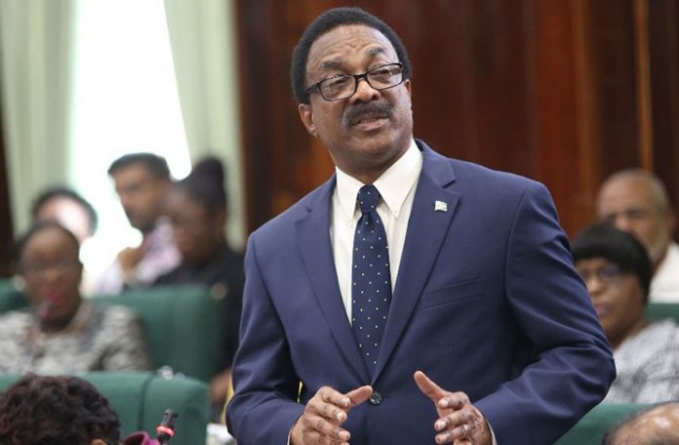Parties in ‘residency voting’ case to make more submissions
Attorney-General and Minister of Legal Affairs Basil Williams on Monday maintained that the residency requirement for voting in Guyana was reinstituted in 1991.
He iterated the State’s position in response to questions posed by the Court of Appeal on the validity of the Constitution Amendment Act No. 4 of 1991 when the case challenging the High Court’s decision to block the removal of persons from the National Register of Registrant Database (NRRDB) was heard on Monday.
In the partial appeal, the Attorney-General V Christopher Ram, the Chief Elections Officer, the Guyana Elections Commission (GECOM) and the Guyana Bar Association (Amicus Curiae), the Appellate Court asked the two sides to submit arguments on the validity of the Constitution Amendment Act No. 4 of 1991, taking into account the provisions of Article 164 of the Constitution, and secondly, if validly enacted, to address the question of residency in Article 159 (2) (a) for qualification to be registered as an elector.
In his original written submission, the Attorney-General, who is being supported by Solicitor General Nigel Hawke, argued that by virtue of Constitution (Amendment) No. 4 of 1991, the residency requirement for voting in Guyana was reinstituted and became a necessary requirement to qualify to be an elector. Article 159 2 (a) of the Constitution, he argued, was amended to read to include the residency requirement.
FELL INTO ERROR
Minister Williams told the Court that Chief Justice Roxane George-Wiltshire fell into error by failing to address her mind to that particular amendment, a position he maintained on Monday.
“Albeit an argument may be advanced that there was omission of the alteration of the revised Constitution by Section 2(f) of the Constitution (Amendment) (No.4) Act 1991 ( Act No. 36 of 1991), and that the omission of an alteration to the article of the revised edition of the Constitution, this omission, whether inadvertent or not, does not affect the validity of the article of the Constitution,” he said, while pointing to Section 10 of the Law Revision Act, Chapter 2:02.
Further in support of his position, the Attorney-General, in his submission, had referenced Article 159 (2) (C), explaining that it provides a mechanism to facilitate the socio-political changes that would necessitate the extension of the list of qualifications.
Article 159 (2) (C) reads: “(2) Subject to the provisions of paragraph (3) and (4), a person shall be qualified to be registered as an elector for elections for elections if, and shall not be so qualified unless, on the qualifying date, he or she is of the age of eighteen years or upwards and either – (C) satisfies such other qualifications as may be prescribed by or under any law.”
He, therefore, argued that by virtue of that provision, Section 6 (2) (a) of the National Registration Act, Chapter 19:08 makes residency part of the list of qualifications under “any law.”
“Moreover, the mere fact that Article 159 of the Constitution and Section 6 of the National Registration Act deals with the same subject matter i.e. registering qualified persons to be electors, the provisions in these two legal instruments cannot be read in isolation. Together they, along with other enactments, are part of one system or code (election laws) and therefore should be interpreted as enforcing (and complementing) each other.
IN PARI MATERIA
In other words, they must be read in pari materia. The general principle of in pari materia, a rule of statutory interpretation, says that laws of the same matter and on the same subject must be construed with reference to each other,” the Attorney-General argued.
Reinforcing the State’s position during an interview with the Guyana Chronicle on Monday, the Attorney-General said he will also be relying on the Cedric Richardson case in his response to the questions posed by the Appellate Court. In requesting additional time to respond to questions posed, Ram’s Attorney-at-Law, Anil Nandlall reportedly told the Court that the Constitution Amendment Act No. 4 of 1991 was not raised by the State when the case came up in the High Court.
“We have always contended that [and] Mr. Marcus [has] argued that we couldn’t argue what was never raised,” Minister Williams told this newspaper. He explained that prior to the Chief Justice’s August 14, 2019 ruling, in which she refused a number of orders sought by Ram, the issue of “residency” not being requirement for electors was not raised.
SUNSET LEGISLATION
Nandlall and his client have also submitted to the Appellate Court that the Constitution Amendment Act No. 4 of 1991 is a “sunset legislation”, meaning that the measure within it ceased to have effect after a specific period. But in rebuffing this, Ministers Williams said he and his battery of lawyers will respond to those contentions in his submission. He said Nandlall and his client are trying to delay the case. The Appellate Court has given Ram and his Attorney by February 3, 2020 to make submissions on the questions posed, while the Attorney-General would be required to respond by February 5, 2020. Oral arguments and summing up by the two sides will be made on February 6, 2020.






















